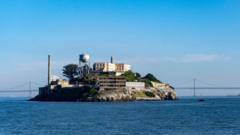Former President Donald Trump took to social media to declare a bold initiative to reopen and expand the historic Alcatraz prison, aiming to house repeat offenders. But critics question the feasibility and implications of such a revival.
Trump Announces Plans to Reopen Alcatraz as New Federal Prison

Trump Announces Plans to Reopen Alcatraz as New Federal Prison
In a controversial move, President Trump aims to revive the infamous Alcatraz prison to combat rising crime rates.
Trump described the measure as a necessary step to bolster law and order in the United States, stating that "for too long America has been plagued by vicious, violent, and repeat criminal offenders." He revealed that he is instructing various federal agencies, including the Bureau of Prisons and the Department of Justice, to undertake efforts to restore the prison and make it ready for use.
Originally closed in 1963 and transformed into a tourist attraction, Alcatraz, which is located on an island in San Francisco Bay, holds a notorious place in American criminal history. Under Trump's plan, the reopened facility would accommodate what he termed "America's most ruthless and violent offenders."
Alcatraz, historically significant for housing infamous criminals such as Al Capone, Mickey Cohen, and George "Machine Gun" Kelly, became a symbol of law enforcement. Its closure resulted from excessive operating costs, which were magnified by its remote location.
Recently, Trump has been in conflict with judicial entities over his approach to managing crime, including his previous actions of sending gang members to prisons abroad, like a controversial group of alleged Venezuelan gang members dispatched to El Salvador earlier this year. This new plan for Alcatraz appears to echo his stringent stance on crime and suggest a pivot back toward traditional incarceration methods.
The announcement has sparked various reactions, with supporters viewing it as a strong step toward tackling crime, while skeptics raise concerns about practicality, societal implications, and the historic resonance of the notorious prison.
Originally closed in 1963 and transformed into a tourist attraction, Alcatraz, which is located on an island in San Francisco Bay, holds a notorious place in American criminal history. Under Trump's plan, the reopened facility would accommodate what he termed "America's most ruthless and violent offenders."
Alcatraz, historically significant for housing infamous criminals such as Al Capone, Mickey Cohen, and George "Machine Gun" Kelly, became a symbol of law enforcement. Its closure resulted from excessive operating costs, which were magnified by its remote location.
Recently, Trump has been in conflict with judicial entities over his approach to managing crime, including his previous actions of sending gang members to prisons abroad, like a controversial group of alleged Venezuelan gang members dispatched to El Salvador earlier this year. This new plan for Alcatraz appears to echo his stringent stance on crime and suggest a pivot back toward traditional incarceration methods.
The announcement has sparked various reactions, with supporters viewing it as a strong step toward tackling crime, while skeptics raise concerns about practicality, societal implications, and the historic resonance of the notorious prison.




















